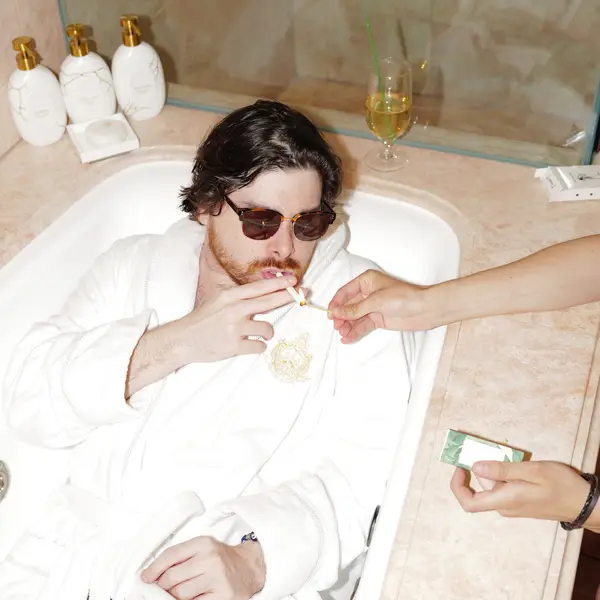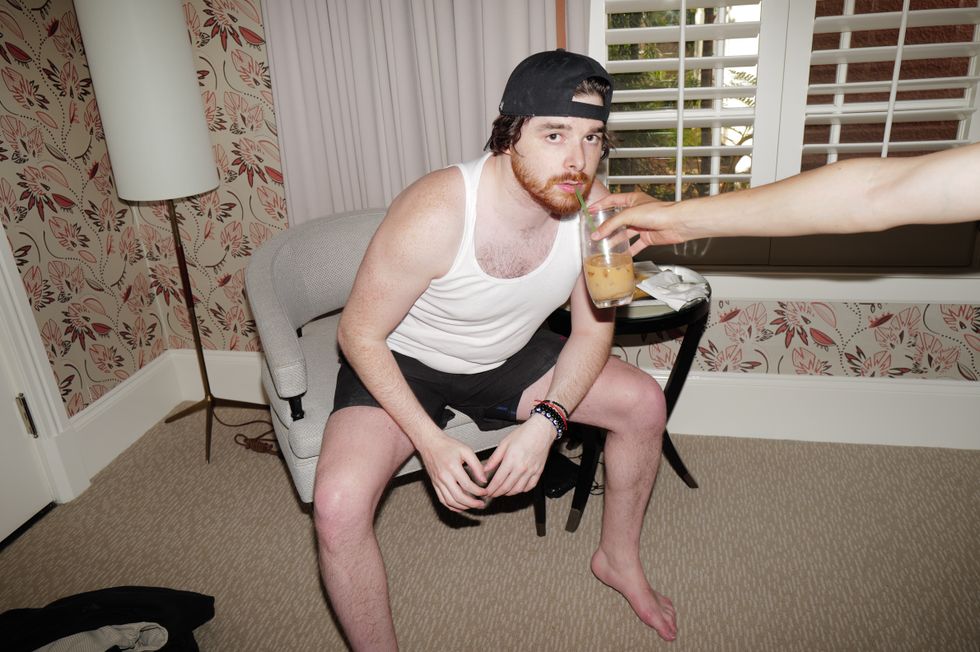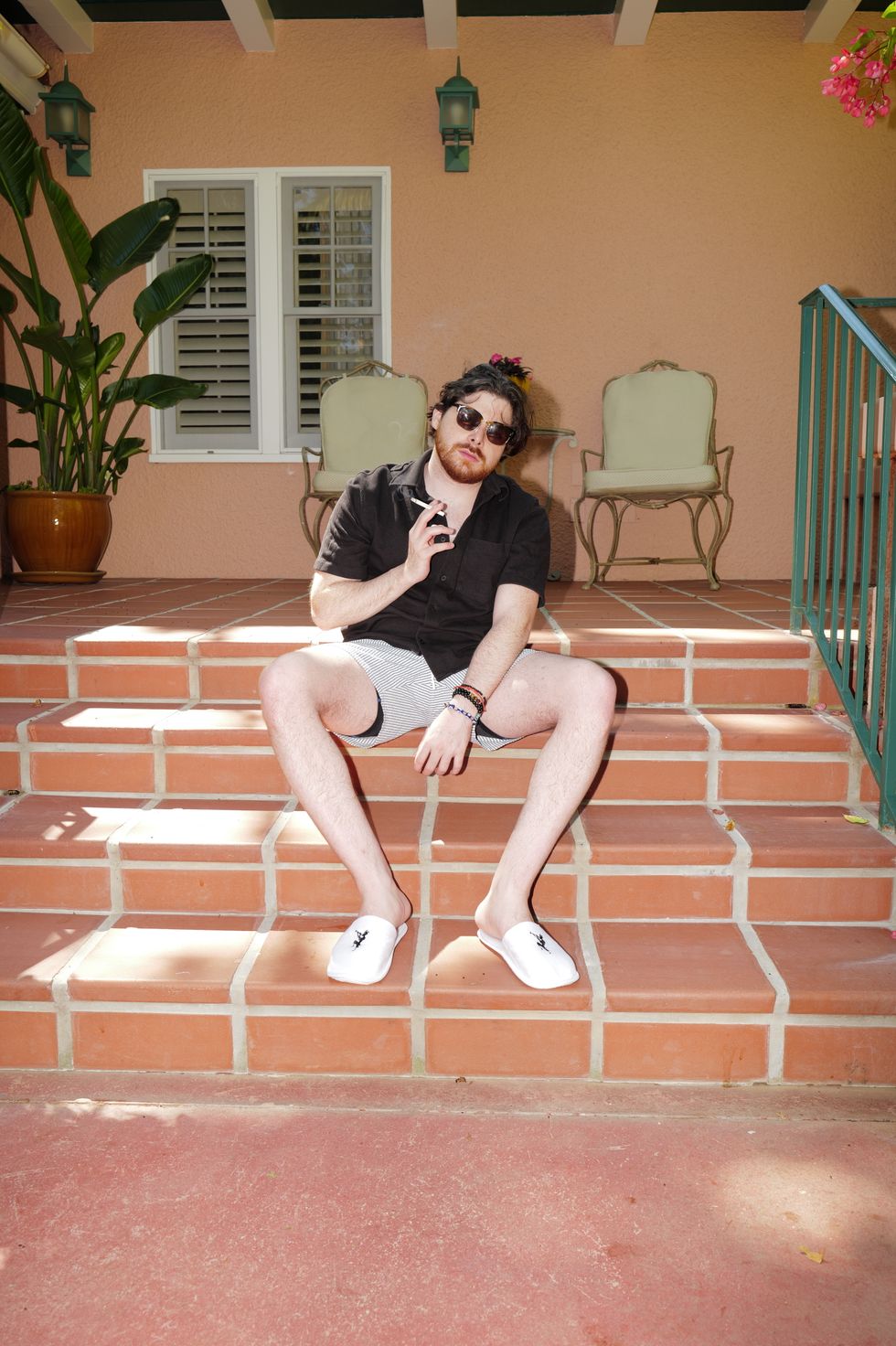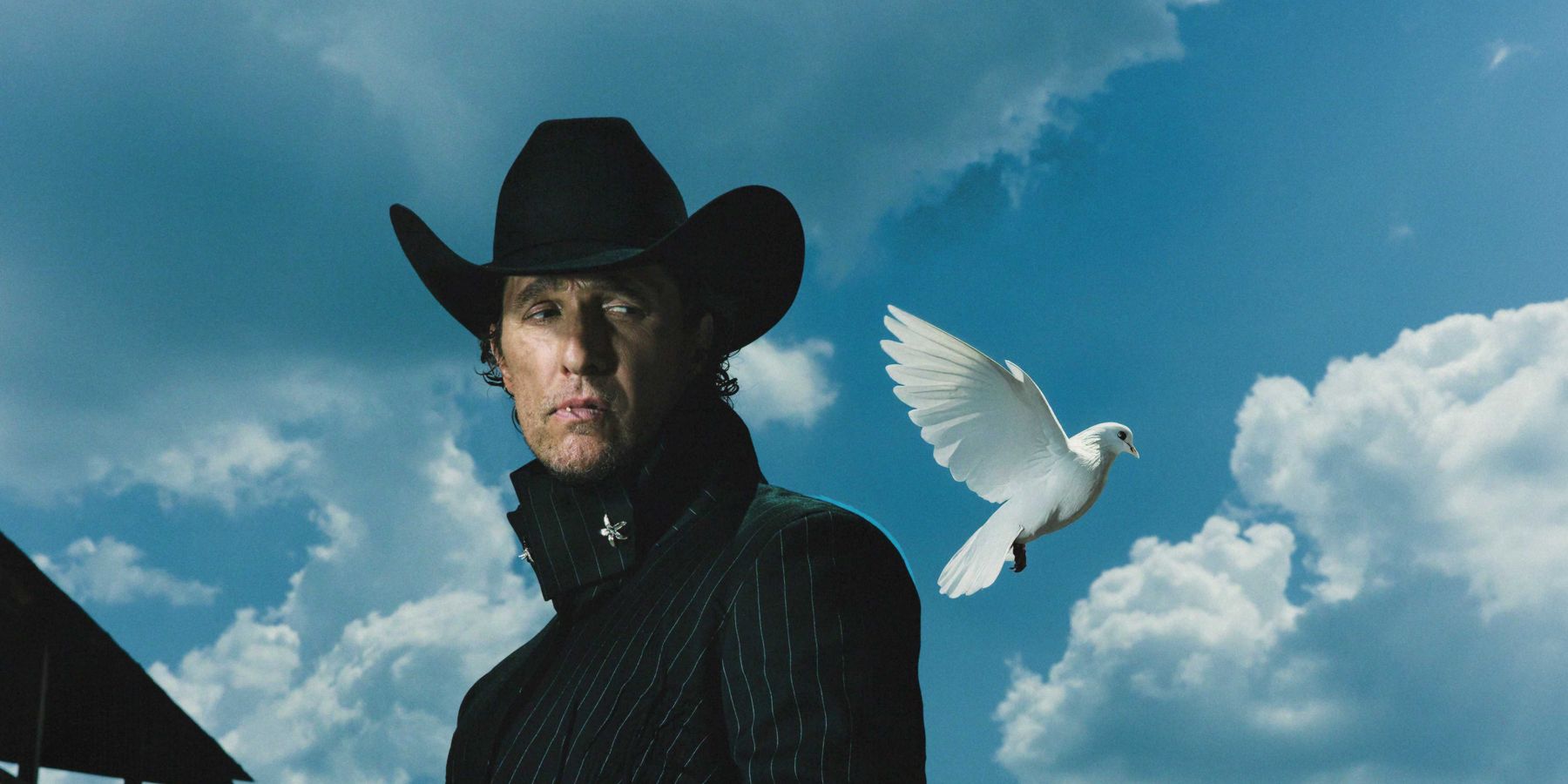
Alex Kazemi Yearns To Be Understood
By Ivan Guzman
Jun 25, 2025“Mental case.” “Fame-seeker.” “Nepo baby.” These are just a few of the names thrown at Alex Kazemi through in-depth online research and word-of-mouth industry hearsay. Doing digging on Kazemi is difficult. The 31-year-old novelist has no social media accounts or digital feeds to reference, making him an internet enigma. Is he a clout-chaser? A PR mastermind? Or simply a misunderstood pop genius who has somehow infiltrated all of our feeds while being off the grid?
Maybe it’s all three. The Vancouver-based artist has emerged as a Gen Y cultural artifact — a relic of a different internet, a prophet of the personal brand and the poster boy for what happens when Tumblr teens grow up but their hyperfixations do not. His debut novel, New Millennium Boyz, is a toxic, gleefully disturbing exploration of Y2K teen nihilism and digital-age identity. It’s the kind of book that had publishers slapping content warnings on the cover. Matty Healy was caught with the book on his nightstand. Now, in true DVD director's-cut fashion, the new paperback uncensored version is out, and a movie adaptation by the producers of Spring Breakers and American Psycho is in the works. Kazemi, of course, insists this was all part of the plan.
"This might make people uncomfortable, but I’d rather be transparent about being calculated instead of hiding behind fake laughs and social chess,” Kazemi tells PAPER. “People know when I’m at their dinner table, I’m here to collaborate and get shit done.” His first time in New York last month landed him a spot on Page Six and a sold-out event at The Strand, produced by Kelly Cutrone. "It was my prom king moment," he says. "I was so surprised she got a cake made. It was so sweet." People who'd followed Kazemi since his Tumblr-era fish-on-tongue virality showed up in person. He calls the early manuscript a “2013 Tumblr cult moment” but promises it won't stop there.

Kazemi never moved to LA or NYC. “People think I’m a recluse because I networked through the internet, but was never physically there at any cool parties,” he says. He started out writing for early 2010s music blogs and dropped out of high school (he recounts how Sky Ferreira advised him not to). It somehow worked, though: in 2021, Madonna read paragraphs from the then-27-year-old’s book Pop Magick on Instagram like scripture.
The son of a wealthy Canadian property developer, Kazemi grew up in privilege but spent most of his teens obsessively hustling and networking toward the career he wanted in his twenties. "I think my biggest life struggle has been trying to understand the juxtaposition of growing up with so much privilege, yet being a traumatized neurotic mess,” he says. “That’s a conflict all three boys in the novel struggle with, too. Not a coincidence."
When we meet, he’s in a robe at the Beverly Hills Hotel, sipping a vanilla shake and obsessing over how long it is taking the hotel to bring him cupcakes. A red Kabbalah string hugs his wrist. When a friend on set asks Kazemi who he’s texting, he replies casually: “Lindsay Lohan.” He tells me he once packed up his bags and ditched a Sunset hotel because they wouldn’t bring an Apple TV to the room. He interrogates me about Addison Rae’s music career, then flips the convo to whether I own a Lacoste polo. He puts on puppy dog eyes. “I think some of us do get damaged by the world, but for me, I came into the world with a broken heart. I stand by that,” he adds. “Can you put that in the article?”
This is the rhythm of Kazemi: part sad boy, part performance artist, always marketing. We first met before the pandemic — digitally, of course. And since then, Kazemi seems to pop up in my iMessage at the most interesting times. He’s kind of like a spiritual spy, or a zodiac therapist of sorts. He practices Magick, but something about his demeanor warms me to him as a pen pal — if not a friend.
At Stories LA, during Honor Levy’s book launch, he manages to sneak his own book onto the sales counter. “Thank you so much for your support, Stories,” he says to the cashier. Kazemi in true businessman fashion sees every moment as an opportunity — to sell, to charm, to control. “I think of my career as a community project. If you’re down to help, great. If not, you probably won’t hear from me again,” he says, not even blinking. One moment he’s ranting about a writer whose book is more popular than his, the next he’s asking me if I believe in mass social media deletion as a way to spiritually reset society. “There’s no adult culture anymore,” he says. “Someone needs to plan a mass deletion. Every person deletes their social media at the same time. Send a message to the corporations.”

He opens up in flashes: About almost dying of lymphoma as a preteen, the source of his “need to get as much done as possible, since I learned at a young age, being alive is not guaranteed” agenda; about OCD over “house intruders,” so consuming he checks the locks all night; about craving real intimacy but having no real friends. "Every relationship in my life is parasitic,” he muses. “I do often fantasize about what it would’ve been like to be normal, go to college, and build healthy relationships in a normal workplace.”
New Millennium Boyz is grotesque and gripping. Its characters mutilate a rat, attack a disabled girl, and drop homophobic slurs like Gen Zs say “slay.” “The book is about the fixation we all have on inventing our public image,” he says. “What happens when footage exists that contradicts that image? Can you handle not being perfect?”
Through all the self-described neuroses, it’s still fun and stimulating to talk to Kazemi about pop music and the zeitgeist. He talks about Brat summer like it was a collective fever dream. “In ten years, we’ll look back and all be so happy we participated with so much love and passion,” he says. “But looking back now at cringe videos of me dancing on a pole to ‘Von Dutch’ at the club as a 30-year-old man, it seems extremely tragic, and like a cry for help.”
At Urth Caffé, over iced chai rooibos, he floats a theory about Charli’s next rebrand. “She destroyed the green Brat flag on stage. That wasn’t just a moment, it was a warning. I hear from close mutual friends that Charli has a lot up her sleeve and to expect the unexpected. She’ll never repeat the same thing twice. She’s stubborn.” He grins, but then grows quiet. “She was one of the first people to believe in me. Imagine how crazy it’d be if she was involved in the movie adaptation somehow? Everything would be so full circle. She loves Thirteen.”
This performance of celebrity obsession — and the curated collapse that inevitably comes with it — lingers in the air. Kazemi knows how to manufacture a moment, but he’s also constantly wrestling with the fallout. The next morning, I wake up to a voice memo from him: “I feel exposed. I think I’m going to come off too real in this. Too vulnerable. The mask is slipping.”
It’s not the first time he’s told me something like this. Vulnerability, for Kazemi, seems to arrive like weather: sudden, dramatic, hard to ignore. Which is maybe why he talks about his Saturn Return like a cosmic war story: “My uncle committed suicide, I put out a banned novel, I got a movie deal with my favorite producers on the planet. Kelly Cutrone put on a sold-out event for me at The Strand in NYC. The darkest enemies of my past resurfaced. Saturn Return is not a joke.” Jason Stewart, co-host of the How Long Gone podcast, put it best: “If Skrillex and Laura Palmer from Twin Peaks fucked and had a baby, you’d get this guy.”
It’s hard to land on a label for him. If not a “Millennial provocateur,” or a “counter-culture pop artist” like some articles describe him, Alex Kazemi is a deepfake of himself. A curated mirage. A lone wolf workaholic savant in a hotel robe who just wants to be adored, successful and have a crew to hang with him in lonely 5-star hotels. “Do you think I’m a sad person?” he asks. “Or that feeling joy could be more simple than only feeling happy when you accomplish a goal?” Maybe. But for now, he sends the Uber Black, signs the check and smiles.
“Okay, fine. I’ll get the dinner bill, Ivan at PAPER.”
Photography: Kevin Hayeland
MORE ON PAPER
Entertainment
Cynthia Erivo in Full Bloom
Photography by David LaChapelle / Story by Joan Summers / Styling by Jason Bolden / Makeup by Joanna Simkim / Nails by Shea Osei
Photography by David LaChapelle / Story by Joan Summers / Styling by Jason Bolden / Makeup by Joanna Simkim / Nails by Shea Osei
01 December
Entertainment
Rami Malek Is Certifiably Unserious
Story by Joan Summers / Photography by Adam Powell
Story by Joan Summers / Photography by Adam Powell
14 November
Music
Janelle Monáe, HalloQueen
Story by Ivan Guzman / Photography by Pol Kurucz/ Styling by Alexandra Mandelkorn/ Hair by Nikki Nelms/ Makeup by Sasha Glasser/ Nails by Juan Alvear/ Set design by Krystall Schott
Story by Ivan Guzman / Photography by Pol Kurucz/ Styling by Alexandra Mandelkorn/ Hair by Nikki Nelms/ Makeup by Sasha Glasser/ Nails by Juan Alvear/ Set design by Krystall Schott
27 October
Music
You Don’t Move Cardi B
Story by Erica Campbell / Photography by Jora Frantzis / Styling by Kollin Carter/ Hair by Tokyo Stylez/ Makeup by Erika LaPearl/ Nails by Coca Nguyen/ Set design by Allegra Peyton
Story by Erica Campbell / Photography by Jora Frantzis / Styling by Kollin Carter/ Hair by Tokyo Stylez/ Makeup by Erika LaPearl/ Nails by Coca Nguyen/ Set design by Allegra Peyton
14 October
Entertainment
Matthew McConaughey Found His Rhythm
Story by Joan Summers / Photography by Greg Swales / Styling by Angelina Cantu / Grooming by Kara Yoshimoto Bua
Story by Joan Summers / Photography by Greg Swales / Styling by Angelina Cantu / Grooming by Kara Yoshimoto Bua
30 September




